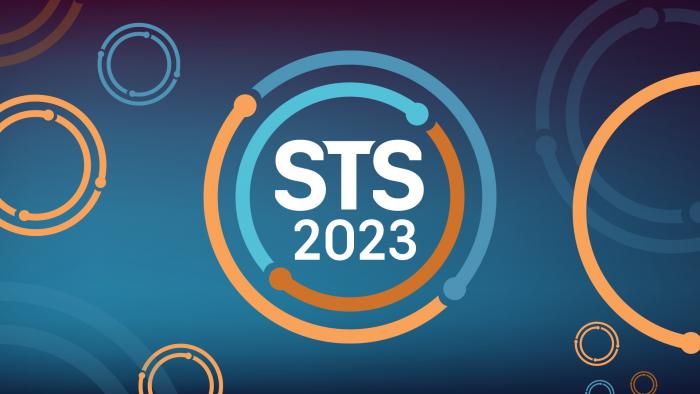A packed house at an STS 2023 scientific session yesterday illustrated the robustness and relevance of the STS National Database™ for gleaning real-time outcomes analysis.
“Virtually all cardiac operations in the United States are captured by our database,” said Ram Kumar Subramanyan, MD, PhD, from the University of Southern California’s Keck School of Medicine, who presented a report on trends in the Congenital Heart Surgery Database (CHSD) component.
In addition to notable trends from each component—adult cardiac, general thoracic, congenital, and Intermacs—presenters hosted a panel discussion with questions from the audience. Participants then heard the latest findings about the performance of frozen elephant trunk (FET) versus traditional limited repair in acute type I aortic dissection as well as in postcardiotomy shock and 30-day outcomes among patients with severe left ventricular systolic dysfunction.
Kyle Miletic, MD, from Henry Ford Hospital in Detroit, Michigan, unveiled findings that suggest that hemiarch plus FET was a safe operation that does not increase rates of mortality, stroke, paraplegia, or length of stay, though the investigators observed modest increases in circulatory arrest and bypass times.
“While several smaller, single-center studies have shown the efficacy of the use of FET for DeBakey I aortic dissection, concerns of complications remain with this technique,” said Dr. Miletic. Therefore, his team aimed to analyze the outcomes of traditional hemiarch repair with and without FET.
The STS Adult Cardiac Surgery Database was the research team’s source for a wealth of data, which they queried for all patients who underwent DeBakey I aortic repair between January 2017 and December 2020. They included all patients presenting with aortic dissection with extension distal to zone 1, excluding those who had previous aortic surgeries or total arch repairs. Patients were divided into two groups: Hemiarch and Hemiarch + FET.
Dr. Miletic’s team used propensity scores to assemble a matched cohort in which those with and without FET would be balanced on key measured baseline characteristics. A multivariable logistic regression model with baseline characteristics that were different between groups was used to estimate propensity scores. Subsequent outcome analyses were based on the matched cohort.
They found that there was no significant difference between the groups in 30-day mortality, stroke, paralysis, and ICU or total length of stay, and that there were fewer readmissions in the Hemiarch + FET group.
Moderated by Karen Kim, MD, and Felix Fernandez, MD, MSc, the session, titled “The State of Cardiothoracic Surgery: Data and Practice Trends from the STS National Database,” also featured comments from STS President John H. Calhoon, MD, who said that it was energizing to have everyone in the room focused on improving safety and outcomes, thanking the council members, presenters, and STS staff who help to manage and curate the Database. “This is the future of STS,” Dr. Calhoon said, “and we’ve got to get this right.”
